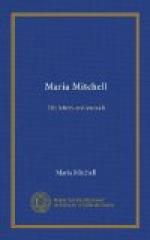“Returning one day from a drive, I met two priests descending one of the upper flights of stairs in the house where I lived. As my rooms had been blessed once, and holy water sprinkled upon them, I thought perhaps another process of that kind had just been gone through, and was about to pass them, when one of them, accosting me, asked if I were the Signorine Mitchell,—changing his Italian to good English as he saw that I was, and introducing himself as Father Secchi. He told me that the younger man was a young religieux, and the two turned and went back with me.
“I recalled, as I saw Father Secchi, an anecdote I had heard, no way to his credit,—except for ingenious trickery. It was said that coming to America he brought with him the object-glass of a telescope, at a time when scientific apparatus paid a high duty. Being asked by some official what the article was, he replied, ‘My looking-glass,’ and in that way passed it off as personal wardrobe, so escaped the duty. (It may have been De Vico.)
“Father Secchi had brought with him, to show me, negatives of the planet Saturn,—the rings showing beautifully, although the image was not more than half an inch in size.
“I was ignorant enough of the ways of papal institutions, and, indeed, of all Italy, to ask if I might visit the Roman Observatory. I remembered that the days of Galileo were days of two centuries since. I did not know that my heretic feet must not enter the sanctuary,—that my woman’s robe must not brush the seats of learning.
“The Father’s refusal was seen in his face at once, and I felt that I had done something highly improper. The Father said that he would have been most happy to have me visit him, but he had not the power—it was a religious institution—he had already applied to his superior, who was not willing to grant permission—the power lay with the Holy Father or one of his cardinals. I was told that Mrs. Somerville, the most learned woman in all Europe, had been denied admission; that the daughter of Sir John Herschel, in spite of English rank, and the higher stamp of Nature’s nobility, was at that time in Rome, and could not enter an observatory which was at the same time a monastery.
“If I had before been mildly desirous of visiting the observatory, I was now intensely anxious to do so. Father Secchi suggested that I should see Cardinal Antonelli in person, with a written application in my hand. This was not to be thought of—to ask an interview with the wily cardinal!
FROM A LETTER TO HER FATHER.
... I am working to get admitted to see the observatory, but it cannot be done without special permission from the pope, and I don’t like to be “presented.” If I can get permission without the humbug of putting on a black veil and receiving a blessing from Pius, I shall; but I shrink from the formality of presentation. I know thou’d say “Be presented.”
“Our minister at that time had the reputation of being very careless of the needs and wishes of his countrymen, and I was not surprised to find a long delay.




